Federal judge says Trump's National Guard activation was illegal, but appeals court stays order
UPDATE: Judge Charles Breyer issued the ruling in a case brought by California officials, but the Ninth Circuit issued an "administrative stay" Thursday night.
A federal judge on Thursday evening ruled that President Donald Trump’s weekend order activating the California National Guard was issued illegally because it did not follow the required procedures. As such, Judge Charles Breyer ordered that Trump must “return control of the California National Guard“ to California Gov. Gavin Newsom “forthwith.”
The “forthwith,” however, came with a caveat — as Breyer, the younger brother of retired Justice Stephen Breyer, stayed his temporary restraining order ruling until noon Pacific Time Friday. To that end, the Justice Department nearly immediately filed a notice that it was appealing the ruling to the U.S. Court of Appeals for the Ninth Circuit. An emergency motion for a stay pending appeal was filed before 7 p.m. PT.
[UPDATE, 11:35 p.m. ET: By 8:30 p.m. PT, a Ninth Circuit panel had issued an "administrative stay" of Breyer's TRO through at least Tuesday — which would therefore mean Trump's activation of the California National Guard would remain in effect over the weekend absent a further court order.
The panel is made up of Judges Mark Bennett and Eric Miller, both Trump appointees, and Judge Jennifer Sung, a Biden appointee.
Minutes after the panel filed its administrative stay order, California filed its opposition to DOJ’s request. Notably, one of their arguments was the “serious questions” regarding whether the appeals court even has jurisdiction over a purported appeal of a TRO.]
The decision from Breyer — a Clinton appointee to the Northern District of California — came a few hours after a hearing on Thursday on the temporary restraining order request in the lawsuit filed by California Attorney General Rob Bonta earlier this week with Newsom as the lead plaintiff in the case.
Although Trump claimed that his order was issued to “protect” U.S. Immigration and Customs Enforcement and other federal personnel carrying out the Trump administration’s immigration raids in the face of protests in Los Angeles, Homeland Security Secretary Kristi Noem suggested a far broader and even more brazenly unconstitutional purpose on Thursday just hours before the hearing.
“We are not going away,” Noem said at the news conference where California Sen. Alex Padilla was forcibly removed. “We are staying here to liberate the city from the socialists and the burdensome leadership that this governor and that this mayor have placed on this country and what they have tried to insert into the city.“
Breyer, though, didn’t even need to get there on Thursday. As he explained at the hearing, he believed the best approach was to take the case one step at a time — with the first step being to decide the issue of whether the National Guard was properly nationalized first.
A few hours later, he did so.
“[T]he Court must determine whether the President followed the congressionally mandated procedure for his actions. He did not,” Breyer wrote. “His actions were illegal both exceeding the scope of his statutory authority and violating the Tenth Amendment to the United States Constitution. He must therefore return control of the California National Guard to the Governor of the State of California forthwith.”
Despite the fact that Breyer stated he was issuing a temporary restraining order — which is not generally appealable — and set a schedule for determining whether he would issue a preliminary injunction following a June 20 hearing — which would be appealable — DOJ nonetheless is trying to appeal Breyer’s TRO.
In his 36-page opinion, Breyer determined whether Trump’s order properly followed the procedures laid out in 10 U.S.C. 12406.
In relevant part, Trump’s order stated, “To the extent that protests or acts of violence directly inhibit the execution of the laws, they constitute a form of rebellion against the authority of the Government of the United States.“
Before getting to that, Breyer first addressed the Justice Department’s argument that courts were barred from examining the question at all. “[A]t the hearing Defendants contended that the President could invoke § 12406 on no evidence whatsoever and remain immune from judicial review,“ Breyer noted.
Not so, he wrote:
Defendants misconstrue the plain language of § 12406, however. The statute permits the President to federalize the National Guard “[w]henever” one of the three enumerated conditions are met, not whenever he determines that one of them is met.
Noting how the Justice Department had — largely unsuccessfully thus far — made similar arguments against judicial review under the “political questions” doctrine in Alien Enemies Act challenges, Breyer agreed with the reasoning on that note in the first such final judgement against the AEA proclamation.
Further, he noted, “[T]his case is not one involving the kind of foreign policy or national security questions that traditionally are left to the President. It instead implicates the President’s domestic use of military force, a matter on which the courts can certainly weigh in.“
As to the alleged “rebellion” that Trump claimed to be at issue, Breyer wrote, “The protests in Los Angeles fall far short of ‘rebellion.’“ Specifically, “While Defendants have pointed to several instances of violence, they have not identified a violent, armed, organized, open and avowed uprising against the government as a whole. The definition of rebellion is unmet.“
Further, he added:
[T]he Court is troubled by the implication inherent in Defendants’ argument that protest against the federal government, a core civil liberty protected by the First Amendment, can justify a finding of rebellion. The U.S. Reports are chock-full of language explaining the importance of individuals’ right to speak out against th government—even when doing so is uncomfortable, even when doing so is provocative, even when doing so causes inconvenience.
As a secondary argument, DOJ suggested that Trump’s activation of the National Guard could be based on a determination that “the President is unable with the regular forces to execute the laws of the United States.”
With a weak claim that U.S. Immigration and Customs Enforcement would have been able to carry out more enforcement actions were there no protests, Breyer quickly wiped that aside.
“Even assuming that Defendants are correct, … the statute does not allow for the federalizing of the National Guard when the President faces obstacles that cause him to underperform in executing the laws. … The statute requires that the President be ‘unable’ to execute the laws of the United States,” Breyer wrote. “That did not happen here.”
Additionally, Breyer found that the Trump administration violated the law in another respect because neither Trump nor Defense Secretary Pete Hegseth “issue[d] their orders through [Newsom].” As such, Breyer wrote, they “failed to comply with § 12406.“
Finally, for now, Breyer also found the implementation of Trump and Hegseth’s orders likely violated the Tenth Amendment — the amendment that “reserved to the states” powers not assigned to the federal government in the Constitution.
“[T]he unlawful federalization of those [National Guard] members has interfered with the state’s legitimate police power, and thus it violates the Tenth Amendment,” Breyer wrote.
In light of those findings, Breyer directed the following in his order:
A briefing and argument schedule was set for him to make a decision on whether to issue a preliminary injunction:
Breyer left one major question raised by the litigation unresolved on Thursday: the question of whether the Trump administration’s actions violate the Posse Comitatus Act, which generally bars the military from domestic law enforcement.
Breyer made clear that statements from administration officials on this front concern him. “President Trump reportedly wrote on social media that he had directed his cabinet officials to ‘take any actions necessary to “liberate Los Angeles from the Migrant Invasion,”’ and said, ‘we’re going to have troops everywhere,’ which certainly differs from the circumscribed role professed in the opposition brief,“ he wrote.
Nonetheless, he also wrote that a ruling on this issue was unnecessary now because he “already concluded” the Trump administration’s actions violated 10 U.S.C. 12406:
In other words, because he is giving the plaintiffs — Newsom and California — what they asked for in their TRO request, he can wait to address and resolve this issue, with all its weighty questions.
Check back at Law Dork for the latest on this developing story.



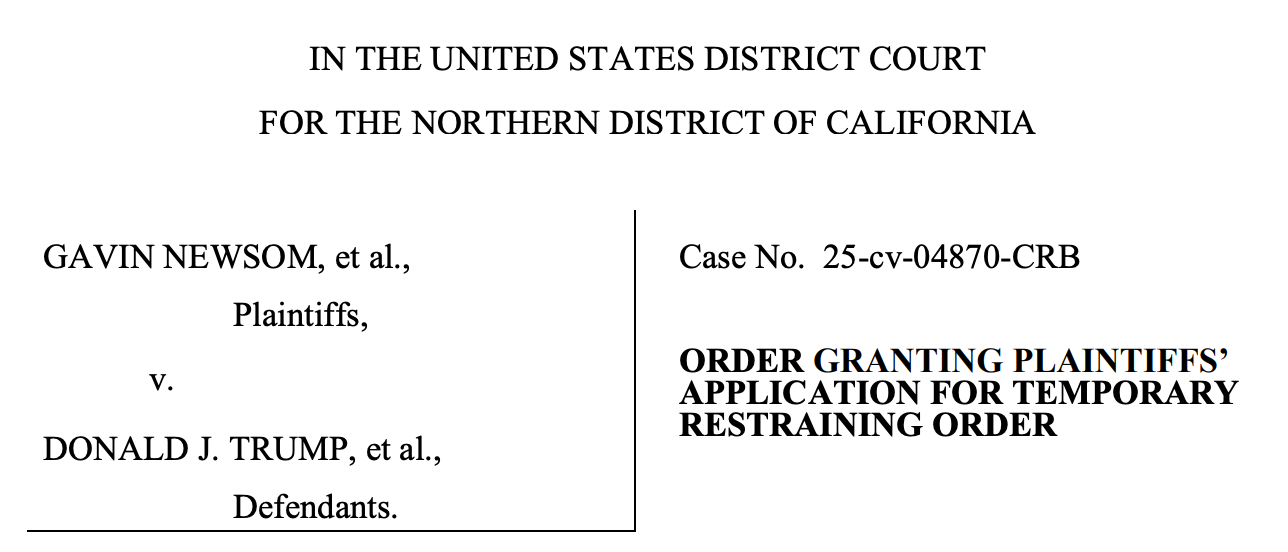
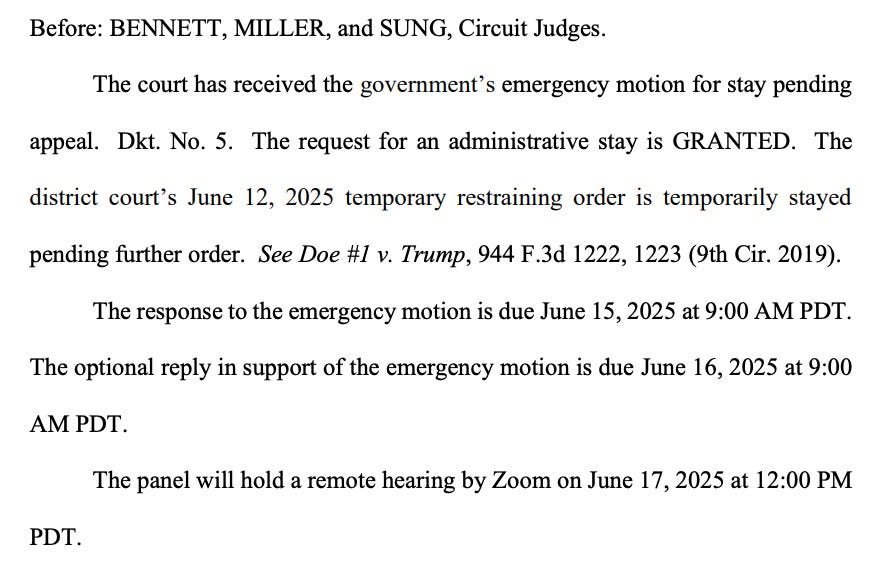
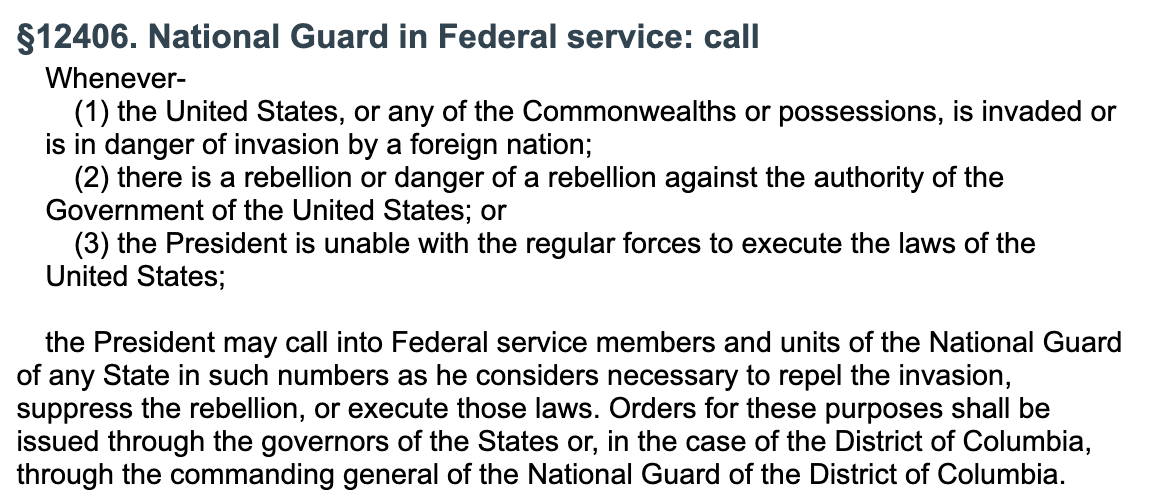
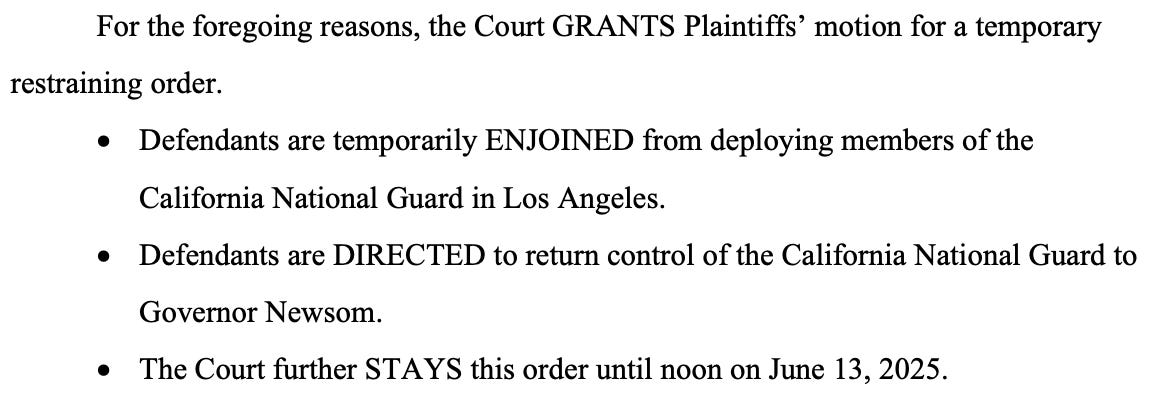
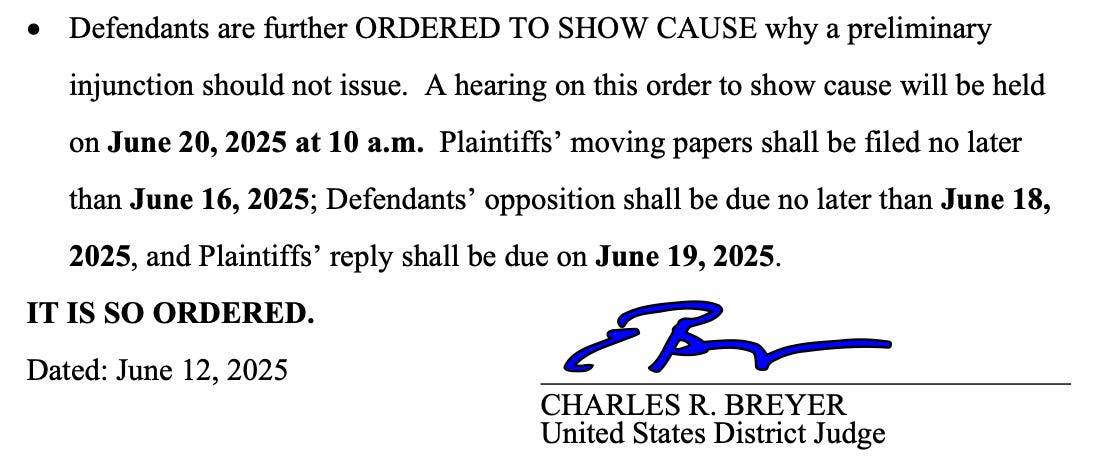
![The Court has already concluded that Defendants exceeded their lawful authority by violating 10 U.S.C. § 12406. The Court therefore need not reach this additional basis for Plaintiffs' ultra vires claim at this early moment in the litigation. When the Court has before it Plaintiffs' motion for a preliminary injunction, the record will be more complete as to any and all military activities, and whether, as Plaintiffs contend, the presence of troops near ICE agents during raids "in dense, urban communities" indeed results in "military forces [being] drawn into a variety of law enforcement activities, such as confronting, interrogating, detaining, or searching civilians perceived as security threats." See Reply at 12. At that point— just a week from now— the parties will be free to make whatever arguments they wish in connection with the Posse Comitatus Act. The Court has already concluded that Defendants exceeded their lawful authority by violating 10 U.S.C. § 12406. The Court therefore need not reach this additional basis for Plaintiffs' ultra vires claim at this early moment in the litigation. When the Court has before it Plaintiffs' motion for a preliminary injunction, the record will be more complete as to any and all military activities, and whether, as Plaintiffs contend, the presence of troops near ICE agents during raids "in dense, urban communities" indeed results in "military forces [being] drawn into a variety of law enforcement activities, such as confronting, interrogating, detaining, or searching civilians perceived as security threats." See Reply at 12. At that point— just a week from now— the parties will be free to make whatever arguments they wish in connection with the Posse Comitatus Act.](https://substackcdn.com/image/fetch/$s_!ODVo!,w_1456,c_limit,f_auto,q_auto:good,fl_progressive:steep/https%3A%2F%2Fsubstack-post-media.s3.amazonaws.com%2Fpublic%2Fimages%2F96a6bbd2-3103-44ff-a8ff-52c821db3a4a_1160x580.png)
Thank you for the helpful (and very quick) explanation.
Just like trump in his business life, A Loser!!
It’s funny the party of law and order are letting this administration cherry pick the amendments they like and disregard the ones they don’t!!